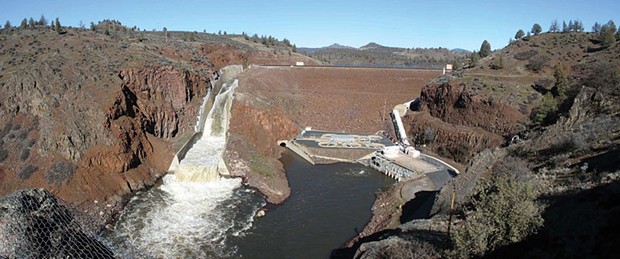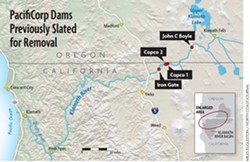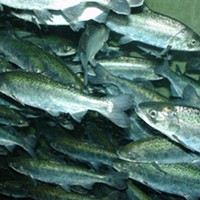Tuesday, February 2, 2016
Feds Announce New Klamath Accord to Remove Dams by 2020
Posted By Thadeus Greenson @ThadeusGreenson on Tue, Feb 2, 2016 at 1:47 PM
A new deal has been reached to remove the four hydroelectric dams that clog the Klamath River and revive the largest dam removal project in U.S. history, the federal government announced today.
According to a joint press release, the federal government, the states of Oregon and California and PacifiCorp — the energy company that owns the dams — have reached an agreement in principle to amend the historic Klamath Hydroelectric Settlement Agreement (KHSA) and remove the dams in 2020. The plan, as laid out in the press release, is to submit the amended agreement to the Federal Energy Regulatory Commission’s process on dam decommissioning. If approved, the agreement would see PacifiCorp transfer title of the four Klamath River dams to a third party that would assume liability and take the appropriate steps to remove the dams.
In our cover story last month, “Uncharted Waters,” about the apparent demise of the Klamath agreements, we asked PacifiCorp spokesman Bob Gravely about whether PacifiCorp could surrender its licenses to a joint trust that would then initiate decommissioning and indemnify the company from liability associated with dam removal. “The concept is certainly viable,” Gravely said at the time. “Dam removal for a lot of people means a lot of things, and for us, we just need an outcome for an expired federal license that’s a good outcome for our customers in the eyes of our regulators. With the protections provided by the Klamath Hydroelectric Settlement Agreement, removing the dams and replacing the power was going to be a better way forward for our customers than re-licensing with the new requirements that it would [include].”
While the agreement announced today only pertains to the KHSA — one of three pacts that made up the historic Klamath agreements — officials seemed poised to salvage other aspects of the agreements as well, including some measure of water security for Oregon irrigators and ranchers, and river restoration funding. “The states and the U.S. are actively working with all Klamath Basin stakeholders — members of Congress, tribes, farmers and others — on a comprehensive resolution to restore the basin, advance the recovery of its fisheries, uphold trust responsibilities to tribes, and sustain the region’s farming and ranching heritage.”
The Klamath Basin Restoration Agreement — the cornerstone to the three pacts — was reached in 2010 after years of negotiations between dozens of parties that had long battled over water rights along the 255-mile river system. But the agreement hinged on congressional approval to open up funding for habitat restoration and protect PacifiCorp from liability, and expired at the end of 2015 when Congress failed to pass legislation to move the deal forward.
See the full press release from the feds and the states copied below:
According to a joint press release, the federal government, the states of Oregon and California and PacifiCorp — the energy company that owns the dams — have reached an agreement in principle to amend the historic Klamath Hydroelectric Settlement Agreement (KHSA) and remove the dams in 2020. The plan, as laid out in the press release, is to submit the amended agreement to the Federal Energy Regulatory Commission’s process on dam decommissioning. If approved, the agreement would see PacifiCorp transfer title of the four Klamath River dams to a third party that would assume liability and take the appropriate steps to remove the dams.
In our cover story last month, “Uncharted Waters,” about the apparent demise of the Klamath agreements, we asked PacifiCorp spokesman Bob Gravely about whether PacifiCorp could surrender its licenses to a joint trust that would then initiate decommissioning and indemnify the company from liability associated with dam removal. “The concept is certainly viable,” Gravely said at the time. “Dam removal for a lot of people means a lot of things, and for us, we just need an outcome for an expired federal license that’s a good outcome for our customers in the eyes of our regulators. With the protections provided by the Klamath Hydroelectric Settlement Agreement, removing the dams and replacing the power was going to be a better way forward for our customers than re-licensing with the new requirements that it would [include].”
While the agreement announced today only pertains to the KHSA — one of three pacts that made up the historic Klamath agreements — officials seemed poised to salvage other aspects of the agreements as well, including some measure of water security for Oregon irrigators and ranchers, and river restoration funding. “The states and the U.S. are actively working with all Klamath Basin stakeholders — members of Congress, tribes, farmers and others — on a comprehensive resolution to restore the basin, advance the recovery of its fisheries, uphold trust responsibilities to tribes, and sustain the region’s farming and ranching heritage.”
The Klamath Basin Restoration Agreement — the cornerstone to the three pacts — was reached in 2010 after years of negotiations between dozens of parties that had long battled over water rights along the 255-mile river system. But the agreement hinged on congressional approval to open up funding for habitat restoration and protect PacifiCorp from liability, and expired at the end of 2015 when Congress failed to pass legislation to move the deal forward.
See the full press release from the feds and the states copied below:
Parties Agree to New Path to Advance Klamath AgreementFrom the Karuk Tribe:
Agreement-in-Principle Explores Process through Federal Energy Regulatory Commission
Salem, Ore. – Today, the States of Oregon and California, PacifiCorp and the federal government – through the U.S. Departments of the Interior and Commerce – announced an agreement-in-principle to move forward with amending the Klamath Hydroelectric Settlement Agreement (KHSA).
Under the agreement-in-principle, the parties to the KHSA will pursue its implementation through the administrative process governed by the Federal Energy Regulatory Commission (FERC), using existing funding and on the same timeline. Members of the California and Oregon delegations introduced legislation in the past two Congresses to advance the hard-fought KHSA and two related Klamath agreements; however, the U.S. Congress adjourned last year without acting on legislation to authorize them.
Though the agreement-in-principle focuses primarily on the dam removal portion of the broader pact, it states that the move is an important and necessary first step toward maintaining the broader Klamath settlements. The states and the U.S. are actively working with all Klamath Basin stakeholders – Members of Congress, tribes, farmers and others – on a comprehensive resolution to restore the basin, advance the recovery of its fisheries, uphold trust responsibilities to the Tribes, and sustain the region’s farming and ranching heritage.
The agreement-in-principle states the four parties intend to work with each other and the more than 40 signatories to the KHSA in the coming weeks to develop terms of an amendment to the KHSA to implement its key provisions, including providing for facilities removal. The target date for signing an amended KHSA is February 29.
The KHSA as amended would then be submitted for consideration through FERC’s established processes, which involve public comment. If approved, PacifiCorp would transfer title of the Klamath River dams to a non-federal entity that would assume liability and take the appropriate steps to decommission and remove the dams in 2020.
“The Klamath agreements were the culmination of years of hard work and collaboration across a diverse and committed coalition of parties – and we can’t let that local vision go unfulfilled,” said Secretary of the Interior Sally Jewell. “This agreement-in-principle is an important initial step as we work toward a comprehensive set of actions to advance the long term progress and sustainability for tribes, fisheries and water users across the Klamath Basin.”
"The Agreement in Principle continues the momentum built by those who crafted the original Klamath Agreements,” said Kathryn Sullivan, Ph.D., assistant secretary of commerce for oceans and atmosphere and NOAA administrator. “NOAA considers this the first step along a new path to secure the future of irrigated agriculture and tribal communities, and the fishery. We'll continue to work in close coordination with all the KBRA parties on a comprehensive plan. Too many people have worked too long to let this historical opportunity slip away."
“Oregon is moving forward in the Klamath Basin. We can’t afford to sit back and wait for another crisis to batter these communities,” said Oregon Governor Kate Brown. "Congressman Walden took a step forward by drafting legislation late last year, and today's action is part of a broader movement to work with him and others to get the Klamath Basin agreements back on track.”
“This agreement marks an unprecedented coming together of parties to seek solutions to difficult problems,” said California Secretary for Natural Resources John Laird. “California is committed to the implementation of the Klamath Hydroelectric Settlement Agreement and to continued efforts to achieve a broad settlement of the issues that have plagued the Klamath Basin. This is an important first step toward both of those goals.”
“The certainty and protections provided by the Klamath settlement offer a fair way forward for our customers in Oregon, California and beyond,” said Stefan Bird, president and CEO of Pacific Power, a division of PacifiCorp. “PacifiCorp is committed to continuing to work with our partners in the coming weeks and months to advance this important agreement.”
The four PacifiCorp dams on the Klamath River are authorized for hydroelectric power generation. Regulations require that the dams need to be retrofitted to provide fish passage for salmon, steelhead and other fish. The Oregon and California public utility commissions found that the original KHSA was a prudent alternative for PacifiCorp’s customers.
The agreement-in -principle is available here.
KLAMATH DAM REMOVAL ONE STEP CLOSER TO REALITYFrom CalTrout:
Undeterred by Congressional Inaction, Parties Move Forward with Dam Removal Plan
Washington, DC – Today in Washington, Secretary of Interior Sally Jewell joined representatives from California, Oregon, and Portland based Pacific Power to sign an Agreement in Principle (AIP) outlining plans to remove the lower four Klamath River Dams. The move comes a month after Congressional inaction threatened to derail a package of restoration agreements brokered by Klamath Basin communities in 2010.
“Removal of the lower four Klamath River Dams would be the single greatest salmon restoration action in US history,” says Leaf Hillman, an enrolled Karuk tribal member and Director of the Karuk Department of Natural Resources. Hillman, the Karuk Tribe, and many other groups have fought for years to remove the dams that many see as a death sentence for what was once one of the world’s most prolific salmon runs.
Klamath River Tribes, irrigation districts, conservation groups, California, Oregon, and Pacific Power proposed a broader series of agreements to Congress that would have removed dams, balanced water use, and funded water conservation and habitat restoration activities along the length of the Klamath River. Republican leaders in the House Natural Resources Committee rejected the proposal agreements and thereby killed the settlement package in December. The AIP resurrects the dam removal part of that package.
“We hoped to implement a more ambitious plan to resolve Klamath water disputes between fishing and farming communities but Congressional Republicans blocked our efforts. This Agreement in Principle lays out a strategy that does not require congressional approval or any federal funding,” said Hillman.
Already dam removal advocates have passed legislation in Oregon allowing Pacific Power to collect $200 million from ratepayers to put towards dam removal by 2020. The Oregon and California Public Utility Commissions have ruled that a $200 million rate payer contribution towards dam removal is far cheaper than the costs associated with relicensing the dams which would require construction of fish ladders and other mitigation measures. In addition, California is poised to contribute $250 million from the voter approved water bond.
While there are still plenty of details to work out, dam removal advocates are cautiously optimistic. The AIP calls for dam removal in 2020, same as the original agreement signed in 2010. Still, the Karuk Tribe’s enthusiasm is tempered by threats of lawsuits and opposition by local dam supporters. “The Agreement in Principle is basically an engagement ring; we won’t celebrate until the wedding,” concludes Karuk Chairman Russell “Buster” Attebery.
California Trout Hails New Action Toward Klamath Dam Removal, Urges Investment in RestorationFrom North Coast Congressman Jared Huffman:
Sacramento – Non-profit fish and watershed advocacy group California Trout, one of the original parties to the Klamath Settlement Agreements, releases the following statement in response to today’s announcement that the States of California and Oregon, federal agencies and dam owner PacifiCorp have identified a new path forward to secure the removal of four Klamath River dams.
“It’s encouraging to see continued action toward the recovery of the Klamath River and its native salmon,” said Curtis Knight, Executive Director of California Trout. “Dam removal is an essential first step, but certainly not the only step, in this process. California Trout remains committed to the comprehensive vision behind the hard-won Klamath Agreements, which identified a balanced approach to water use, environmental restoration and community sustainability throughout the basin. ”
Rep. Huffman applauds pact between Feds, California, Oregon and PacifiCorp to remove Klamath River dams in 2020
Huffman: “This agreement is a reflection of all the hard work done by tribal, fishing and environmental communities who have long fought to tear down these dams and bring the Klamath River back to life.”
WASHINGTON, D.C. – Congressman Jared Huffman (D-San Rafael) welcomed the release today of a key agreement between the federal government, California and Oregon, and power company PacifiCorp which is expected to lead to the historic removal of four dams on the Klamath River.
“This agreement is a reflection of all the hard work done by tribal, fishing and environmental communities who have long fought to tear down these dams and bring the Klamath River back to life,” said Rep. Huffman, who represents the North Coast of California including the Lower Klamath River basin. “I am committed to working with the people of the Klamath basin, the state and federal governments, and PacifiCorp toward rebuilding the once-famous salmon and steelhead runs of one of the West Coast’s most iconic rivers.”
The new pact will let the parties work through the Federal Energy Regulatory Commission (FERC) process to remove the dam by 2020. It calls for modifying the Klamath Hydropower Settlement Agreement (KHSA), which was brokered after years of negotiation. A companion agreement, the Klamath Basin Restoration Act, expired at the end of 2015 after Republican congressional leadership in the House failed to introduce legislation to support the deals.
Huffman has long supported the effort to restore the Klamath River, and has worked with the state and federal agencies to support a path around the congressional roadblock. The U.S. Department of the Interior also indicated today that it, the U.S. Department of Commerce and the states of California and Oregon will work on a comprehensive restoration plan for the basin to recover fisheries, uphold trust responsibilities to Klamath tribes and sustain farming and ranching.
Today, Huffman further announced support for the new agreement from the Yurok Tribe, the Hoopa Valley Tribe, and the Karuk Tribe, as well as the support of Humboldt County and the Pacific Coast Federation of Fishermen’s Associations, and he called for California tribes, Humboldt County, fishermen, and environmental groups to be fully involved in any such future agreements.
"We are excited to see these parties' continued commitment to remove the Klamath dams in 2020," said Humboldt County Board of Supervisors Chairman Mark Lovelace. "The ability to come to this agreement is the outcome of the KBRA, KHSA, and years of negotiations in the Klamath basin."
"The Yurok Tribe is pleased that PacifiCorp, the Department of Interior, Oregon, and California are committed to dam removal on the Klamath River by 2020 through an amended KHSA and the FERC process,” said Yurok Tribal Chairman James Dunlap. “Dam removal is the most critical component of fisheries restoration on the Klamath River. We support this effort and look forward to contributing our technical expertise to the process."
“Removal of the lower four Klamath River Dams would be the single greatest salmon restoration action in U.S. history,” said Leaf Hillman, a Karuk tribal member and director of the Karuk Department of Natural Resources. “We hoped to implement a more ambitious plan to resolve Klamath water disputes between fishing and farming communities but Congressional Republicans blocked our efforts. This Agreement in Principle lays out a strategy that does not require congressional approval or any federal funding.”
"The Hoopa Valley Tribe is pleased to see that the main parties agree with the Tribe’s long-held view that dam removal should move forward separately from the other Basin issues that have created controversy in Congress,” said Hoopa Valley Tribe Chairman Ryan Jackson. “The available funding and environmental work creates an opportunity for the administration and the states to dramatically help the river.”
“This agreement in principle is a roadmap for solving some of the problems in the Klamath Basin but by no means all of them,” Pacific Coast Federation of Fishermen’s Association Northwest Regional Director Glen Spain. “Many of the problems can only be solved by congressional action. “We hope that congress will see the urgent need to move forward, but in the meantime the problems remain and solutions must be found in other ways.”
Congressman Huffman has been very active on pushing for congressional action on the Klamath settlement. You can read more about his work here.
Huffman represents California's second congressional district in the House, and serves as the Ranking Democrat on the Water, Power, and Oceans subcommittee.
Speaking of...
-
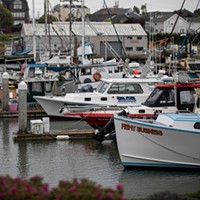
California Salmon Fishing Banned for Second Year in Row
Apr 15, 2024 -

'Our Food is Our Medicine'
Mar 28, 2024 -
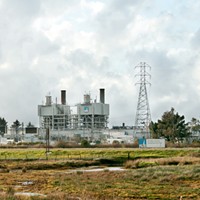
California is not Close to Meeting its Climate Change Mandates
Mar 19, 2024 - More »
Comments (3)
Showing 1-3 of 3
Readers also liked…
more from the author
-
Seeking Salvation
'Living in amends,' a candidate for resentencing hopes for another chance
- Apr 18, 2024
-
UPDATE: Artillery Shell Deemed Safe in Ferndale
- Apr 12, 2024
-
Our Last Best Chance
- Apr 11, 2024
- More »
